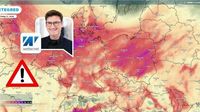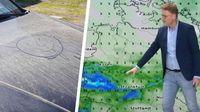On March 21, 2025, a significant Saharan dust cloud is making its way across Germany, with experts warning of its impact on air quality, visibility, and potential health risks. The phenomenon, driven by a warm southern airflow originating from North Africa, has left residents in regions like Allgäu and North Rhine-Westphalia bracing for a very different weather experience this spring.
The day began with milky skies as the dust particles settled in the atmosphere, scattering sunlight and creating a striking visual effect. "The dust causes a milky sky because tiny mineral particles in the air scatter sunlight," notes Dominik Jung, a meteorologist with wetter.net. Temperatures throughout Germany could soar to as high as 20 degrees Celsius, but the dust is expected to impact the amount of sunlight reaching the ground.
Although the Saharan dust isn't a new occurrence—typically arriving in the region 10 to 20 times a year—a combination of climate change and altered wind patterns has led to increased visibility of these dust events. Jung points out that recent studies show 25 to 30 percent of the world's fine dust originates from desert regions like the Sahara, and the observed rise in dust events correlates closely with changing climate conditions.
In Switzerland, the situation is quite similar. Meteo News has reported that the Saharan dust is also returning to Swiss airspace on the same day, with concentrations expected to grow throughout the day, peaking in the evening. As the dust settles, it begins a twofold role; it not only alters visibility but contributes to weather patterns by providing condensation nuclei for cloud formation.
"When it rains in the presence of Saharan dust, we can experience a phenomenon known as 'blood rain,' where red-tinged precipitation occurs," Meteo News explains. This effect can lead to vehicles and outdoor furniture becoming soiled, prompting residents to consider keeping their cars sheltered or covered during the dusty spell.
The health implications are also notable. Individuals suffering from respiratory conditions or asthma might find their symptoms exacerbated by the fine dust particles, which can penetrate deeply into the respiratory tract. With pollen levels potentially intensified through this dust interaction, those with allergies may face heightened discomfort.
In Germany, further observations indicate that the dust may significantly elevate fine dust pollution levels, raising concerns about air quality standards. This has prompted health advisories to recommend limiting outdoor activities for susceptible populations during high dust incidents.
Interestingly, the Saharan dust has implications extending beyond merely periodic discomfort. Current meteorological models predict an increase in such dust clouds, insinuating that these dust events might become a recurring theme in European weather patterns. "In the upcoming years, meteorologists expect an increase in dust clouds over Europe, affecting air quality and altering precipitation patterns," Jung adds.
Alongside the agricultural and ecological impacts, these weather phenomena also have economic implications, particularly for sectors reliant on solar energy. As the dust clouds block sunlight, the generation of solar energy is impeded, affecting both homeowners and businesses that depend on this renewable energy source.
On a local level, the Saharan dust also poses everyday challenges, especially for automotive owners. With many residents looking to spring clean their vehicles, the dust can quickly render freshly washed cars dirty again. The ADAC (Allgemeiner Deutscher Automobil-Club) recommends that car owners should still wash their cars post-dust to maintain visibility through clean windows and headlights, cautioning that accumulated dust could potentially damage the vehicle’s paint if not removed promptly.
As Germany transitions through this Saharan dust event, residents are advised to prepare for fluctuating weather conditions. While Friday offers warm temperatures amid dusty skies, forecasts predict a changeover beginning Saturday, with temperatures dropping and the possibility of rain returning to the forecast.
From the shimmering warm days to dust-induced dullness in the skies, it's evident that the Saharan dust cloud offers a striking illustration of how interconnected our weather systems can be. As scientists and meteorologists work to understand these complex interactions more thoroughly, staying informed and prepared remains essential as the season progresses.







